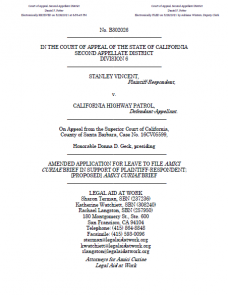Abortion rights, women of color, and LGBTQI+ people are under attack. Pledge to join us in fighting for gender justice.

 On May 26, the National Women’s Law Center joined an amicus brief led by Legal Aid at Work in Vincent v. California Highway Patrol in support of Stanley Vincent pending before the California State Court of Appeal. Mr. Vincent was fired from his job at the California Highway Patrol after he took time off from work to care for his sister.
On May 26, the National Women’s Law Center joined an amicus brief led by Legal Aid at Work in Vincent v. California Highway Patrol in support of Stanley Vincent pending before the California State Court of Appeal. Mr. Vincent was fired from his job at the California Highway Patrol after he took time off from work to care for his sister.
Mr. Vincent is a caregiver for his adult sister who lives in Haiti and has paranoid schizophrenia. Although he does not live nearby, Mr. Vincent provides his sister with financial support, coordinates her care, and periodically travels to visit her in Haiti. Under the California Family Rights Act (CFRA), caregivers like Mr. Vincent who stand in loco parentis—meaning that although they are not a biological or adoptive/foster parent, they take on the rights, duties, and responsibilities of a parent—may take job-protected leave to care for their loved ones. However, when Mr. Vincent took leave to care for his sister, his employer claimed that he was not entitled to the benefits and protections of the CFRA because he did not live with her or provide her with day-to-day care.
NWLC joined this amicus brief because an inclusive in loco parentis standard is crucial to support the caregiving needs of a range of families. Attempting to limit the protections of the CFRA to only those who provide day-to-day caregiving erases the reality of many family caregivers and experiences that the law was intended to cover. This is particularly crucial for people with disabilities and their families, LGBTQ families, and immigrant families who may be separated by distance, like Mr. Vincent’s. Providing care does not look the same for all families. In fact, for many adults with disabilities, living apart from family care providers is common; it both allows people to maintain independence, which can improve individual health and wellness, and helps people receive care that meets their individualized needs. Furthermore, providing care from a distance is a reality for many immigrant families, for whom remittances and financial support are an integral part of the caregiving infrastructure. Amici urge the court to uphold the lower court’s ruling that Mr. Vincent was fired in violation of the CFRA and to reject the California Highway Patrol’s appeal.

